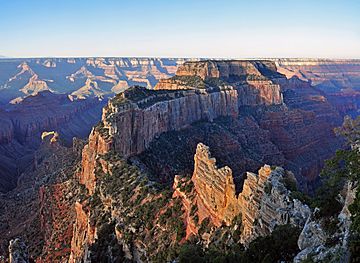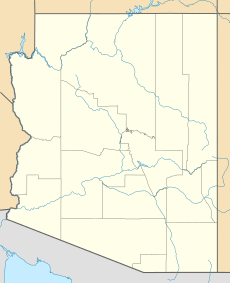Wotans Throne facts for kids
Quick facts for kids Wotans Throne |
|
|---|---|

Northeast aspect, from Cape Royal Overlook
|
|
| Highest point | |
| Elevation | 7,721 ft (2,353 m) |
| Prominence | 596 ft (182 m) |
| Isolation | 7.04 mi (11.33 km) |
| Parent peak | Siegfried Pyre (7,922 ft) |
| Geography | |
| Location | Grand Canyon Coconino County, Arizona, US |
| Parent range | Kaibab Plateau Colorado Plateau |
| Topo map | USGS Cape Royal |
Wotans Throne is a tall rock formation in the amazing Grand Canyon in Arizona, USA. It stands 7,721 feet (2,353 meters) high. Imagine looking down from the North Rim of the canyon! This impressive peak is about one mile southwest of the Cape Royal overlook.
It's also near other cool spots like Freya Castle and Vishnu Temple. Wotans Throne rises a huge 5,200 feet (1,585 meters) above the Colorado River that flows through the canyon.
Contents
How Wotans Throne Got Its Name
Wotans Throne is named after Wotan. Wotan is a very important god in old Germanic myths. A geologist named François E. Matthes gave it this name. He was following a tradition started by Clarence Dutton. Dutton liked to name Grand Canyon features after gods and goddesses from myths.
The name "Wotans Throne" became official in 1906. This was decided by the United States Board on Geographic Names. The area where Wotans Throne is found has a "cold semi-arid climate." This means it's usually dry, but it can get cold, especially in winter.
Understanding the Rocks of Wotans Throne
Wotans Throne is made up of many layers of rock. These layers formed over millions of years. Think of it like a giant cake with different colored layers!
Top Layers: Kaibab Limestone and Coconino Sandstone
The very top of Wotans Throne is covered in trees. This top part is made of a rock called Kaibab Limestone. This layer is about 700 feet thick! Below it, you'll find a cream-colored rock called Coconino Sandstone. This sandstone layer is about 300 feet thick.
The Coconino Sandstone is special. It formed about 265 million years ago from ancient sand dunes. Imagine a huge desert with strong winds blowing sand! Over time, that sand turned into this rock.
Middle Layers: Hermit and Supai Formations
Underneath the Coconino Sandstone, there's a sloping layer called the Hermit Formation. This rock layer is softer and often forms slopes. Below the Hermit Formation is the Supai Group. This group of rocks formed during a time called the Pennsylvanian and Permian periods.
Lower Layers: Redwall Limestone, Tonto Group, and Unkar Group
Even further down, you'll see the Redwall Limestone. This rock is often a reddish color. Below that is the Tonto Group, which formed during the Cambrian period. Finally, at the very bottom, near the creek level, is the Unkar Group. These are some of the oldest rocks in the Grand Canyon!
Water Flow Around Wotans Throne
When it rains on Wotans Throne, the water flows off the sides. This water eventually drains into the Colorado River. On the east side, the water goes into Vishnu Creek. On the west side, it flows into Clear Creek.
Gallery
 | Frances Mary Albrier |
 | Whitney Young |
 | Muhammad Ali |












